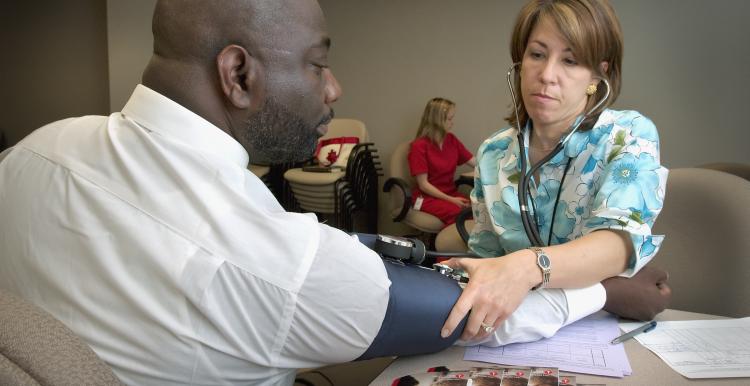Heart Health – Younger People Need to be Taken Seriously

Our Report, Heart Health: Views and Experiences of Hertfordshire Residents, showed a wide range of issues when it came to diagnosis of heart-related conditions, understanding about symptoms and how people could manage their own heart health.
According to the British Heart Foundation (2022) around 24,000 people in Hertfordshire are living with coronary heart disease, so NHS leaders want to use our research to improve cardiovascular health care for local people.
Why did we do this research?
The Hertfordshire and West Essex Integrated Care Board (ICB) Primary Care Board asked Healthwatch Hertfordshire to investigate public understanding of cardiovascular disease and people’s experiences of diagnoses.
Nearly 230 Hertfordshire residents responded to our online survey between March and May 2023, helping us find out:
- What respondents knew about the risks and symptoms of heart disease
- Patients’ experiences of being diagnosed
- How, and to what extent, those with a diagnosis self-manage their condition(s)
- How people can be better supported to self-manage their cardiovascular health risk and existing conditions and/or symptoms.
What did people tell us?
Of those who responded to our survey, 107 (47%) had a medical diagnosis of high blood pressure, Atrial Fibrillation and/or high cholesterol. The remaining 122 (53%) did not have any of these diagnoses.
Symptoms
- 25% of those with a diagnosis had recognised their own symptoms – with 60% visiting their GP and 20% contacting emergency services due to the severity of their symptoms.
- People aged 18-44 were most likely to recognise their own symptoms at 80%, followed by those from an Asian background at 40%. Women were also slightly more likely than men to identify their symptoms, as were those under 65 years old compared to people over 65.
- Respondents without any existing diagnosis most commonly identified breathlessness (46%) and chest pain (27%) as symptoms of heart disease as well as fatigue, dizziness and swelling.
- Worryingly, 11% of respondents said they didn’t know about symptoms and a further 35% skipped the question - which could indicate they were either unsure or not aware of the symptoms.
Diagnosis
- People from a Black ethnic background and those aged 18-44 (particularly men) were far less likely to interact with a local GP or healthcare professional about their heart health because they felt they weren’t listened to about their symptoms.
- As a result, men (particularly those under 65 years old) were more likely to be diagnosed by a hospital doctor than a GP. By not visiting a local healthcare professional earlier, they often experienced more severe symptoms and ended up in emergency care.
- Even amongst people aged over 75, only 57% recalled speaking about their heart health with a healthcare professional, although they’re at greater risk of developing heart disease.
- Concerningly, only 50% of 65 to 74-year-olds said they would visit their GP if they were worried about heart health, despite being at high risk.
Risk Factors
- The average awareness of age as a risk factor was 69% - yet only 62% of over 65-year-olds were aware of age as a risk factor and only 67% of over 75-year-olds were aware.
- Only 54% of respondents were aware that ethnic background was a risk factor.
- Respondents from Black and Asian ethnic backgrounds had a much higher awareness of risk factors associated with heart disease, yet were less likely to know their own blood pressure or cholesterol readings and were more likely to face barriers in getting a diagnosis:
- 100% recognised high blood pressure, high cholesterol, Atrial Fibrillation, smoking, Type 2 Diabetes, inactivity, being overweight, family history, diet and alcohol consumption.
- 80% of Black respondents recognised age (average was 69%) and 60% of Black respondents recognised gender (average was 49%).
- 100% of Black respondents and 71% of Asian respondents recognised ethnic background.
Self-Management/Healthy Lifestyles
- The majority (61%) of respondents said they tried to look after their heart health by living a healthy lifestyle, including eating healthily, regularly exercising, not smoking and limiting their alcohol intake.
- There was a significant gender divide, with 83% of women considering their heart health in their everyday choices either “a lot” or “a little”, compared to 56% of men - despite men’s increased risk.
- People with less disposable income said they found it more difficult to maintain a healthy lifestyle, with Cost of Living pressures adding to the difficulties. Find out more about how the Cost of Living is impacting people’s health here.
What happens next?
Reducing the premature death rate of cardiovascular disease has been made a clinical priority for the Hertfordshire and West Essex ICB and a series of initiatives have been introduced, such as targeted work to raise awareness of the signs and symptoms of Atrial Fibrillation amongst ethnically diverse communities.
Whilst these findings indicate good knowledge and understanding around heart health across Hertfordshire, they also highlight key areas that need improvement:
- Those aged between 18-44 (particularly men) were more likely to be diagnosed in a hospital after experiencing symptoms, rather than by a GP or practice nurse. They were also more likely to face barriers to diagnosis and have concerns about speaking to a healthcare professional about their heart health – despite being at high risk.
- People from an Asian ethnic background had much better awareness of the risk factors associated with heart disease and were more likely to know that ethnicity was a risk factor. Despite this, people from an Asian ethnic background were significantly less likely to know their blood pressure and cholesterol readings and those with diagnoses showed lower levels of confidence in managing their condition and were more likely to face barriers in receiving their diagnosis.
- People from White Other ethnic backgrounds were less likely to know their blood pressure and cholesterol levels and were less confident in self-managing their condition. They also faced more barriers to diagnosis and were more likely to ask their friends and family than visit their GP or a pharmacist if they had concerns.
Downloads
Read the full report here.

